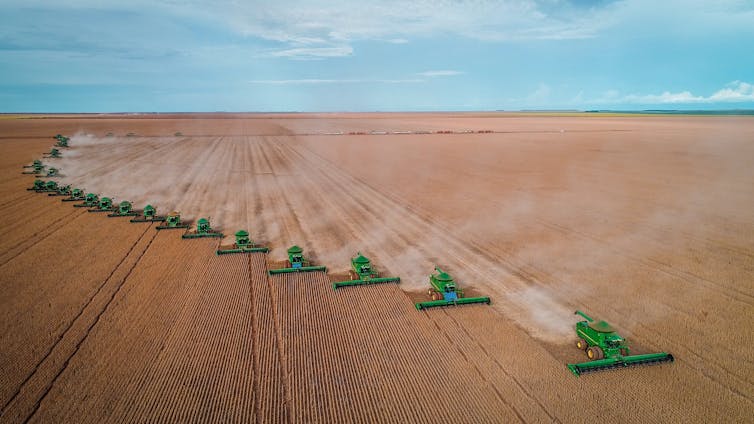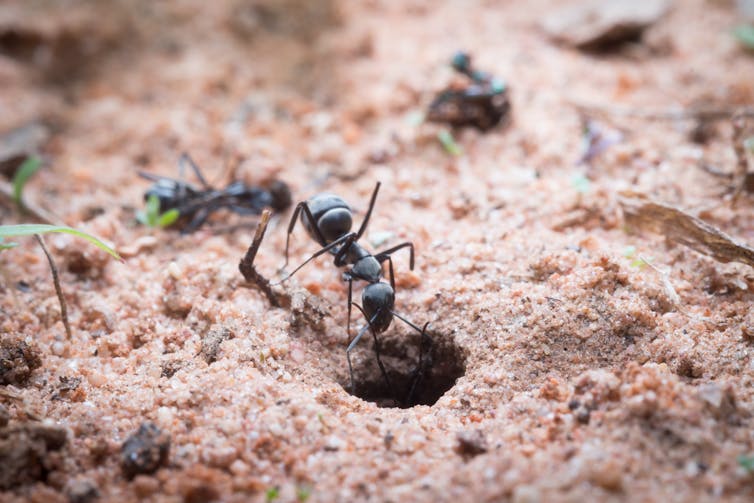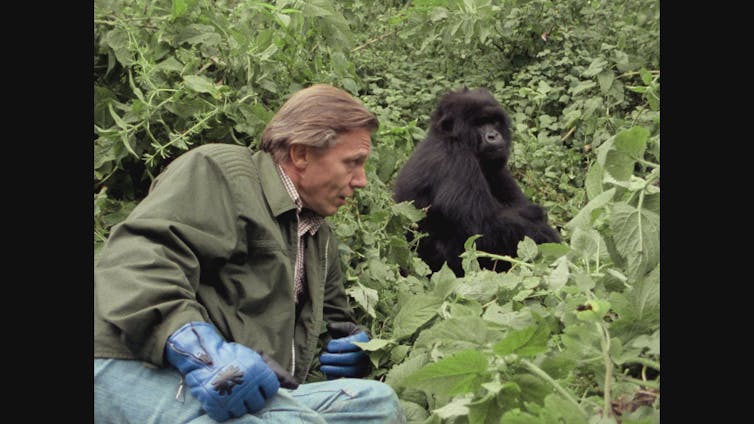'Extinction: The Facts': Attenborough's new documentary is surprisingly radical
We have learned so much about nature from David Attenborough’s documentaries over the past seven decades. In a new BBC film he lays bare just how perilous the state of that nature really is, why this matters for everyone who shares this planet, and what needs to change.
This film is radical. Surprisingly radical. I have written in the past about my growing frustration with Attenborough documentaries continuing, decade after decade, to depict nature as untouched by any mark of humans. I felt this might be contributing to unhelpful complacency about how much “wild” was really left.
“Extinction: The Facts” is a significant departure. As one of the programme’s talking heads, I helped reveal the honest truth: in most places, remaining natural habitats are squeezed between intensive agriculture and urban sprawl.
The film starts with a bleak interview with James Mwenda, the keeper of the world’s last two northern white rhinos; a mother and daughter pair. “When Najin passes away”, says Mwenda, “she will leave the daughter alone forever … Their plight awaits 1 million more species”.
This sequence has a real emotional kick. However, the film makes clear that extinction is about so much more than the loss of large familiar mammals.

“Everything is joined up, from a single pond to a whole tropical rainforest” says Kathy Willis professor of biodiversity at the University of Oxford. “We tend to think we are somehow outside of that system. But we are part of it; and totally reliant upon on it”. The film goes on to explain the impacts of biodiversity loss on our soil functioning (with a star turn from below-ground beasties breaking down leaf litter), the role of insects in pollinating our crops, and how losing trees and wetlands can contribute to landslides and floods.
The potential link between the drivers of biodiversity loss and emerging diseases is also explored. The wildlife trade brings 1,000s of stressed animals into close contact, providing the perfect opportunity for viruses to jump) between species. At the same time, removing large predators results in increased abundance of rodents and bats which are more likely to carry dangerous viruses. “We’ve been changing biodiversity in critical ways which made [the pandemic] more likely to happen”, says Peter Daszak of Ecohealth Alliance.
In footage from the 1992 Earth Summit in Rio, then 12-year-old Severn Suzuki addresses the largest UN meeting to have ever convened. “We are a group of 12 and 13 years olds come to tell you adults that you must change your ways”. The parallels with Greta Thunberg’s recent high-profile speech to the UN serve to highlight how little progress has been made.

So if biodiversity loss is so obviously happening, and so obviously a bad thing for the future of humanity, why have we failed to act and what needs to be done?
Firstly, the film makes it clear that a key ultimate driver is consumption in rich countries. Given that the average Brit consumes more than four times the resources of the average Indian, reducing consumption in places like the UK is vital. This need not be painful. As the eminent Cambridge economist Partha Dasgupta says, “40 years ago people in the UK consumed a good deal less. But there is no evidence that we were unhappier then”. The film starkly highlights what we are losing in exchange for out-of-season food, fast fashion and cheap poultry.
Secondly, having strong environmental standards for things produced in the UK (important though it is), is not enough. We also need to consider where the products we buy and the food we eat comes from – if not, people in countries like the UK are simply offshoring environmental problems for others to deal with.
Finally, the film touched on the need to make us pay the true cost of the environmental damage we do. The idea that businesses should not be able to degrade our environment for free is far from new. However, despite some progress with policies like the UK’s landfill tax or California’s carbon trading scheme, most societies are far from doing this comprehensively.
Together, this is what makes the film so radical. It is explicitly calling for major changes in the way our economies work with a greater focus on both planetary boundaries and global inequality. I was certainly surprised to see this weaved into a Sunday night BBC prime time show.

Towards the end, the film moves back to more conventional conservation territory to insert a much-needed dose of optimism. The final story includes some of the most iconic footage from Sir David’s career: his meeting with Rwanda’s mountain gorillas 40 years ago. At the time, Attenborough felt he might be seeing some of the last of their kind – just 250 individuals were left and their future looked bleak. Today that population is doing much better.
Over his incredible career, David Attenborough has seen more of earth’s natural wonders than almost anyone. To hear him talk, with such clarity, about how bad things are getting is deeply moving. Scientists have recently demonstrated what would be needed to bend the curve on biodiversity loss. As Attenborough says in the final scene, “What happens next, is up to every one of us”.
Julia P G Jones, Professor of Conservation Science, Bangor University
This article is republished from The Conversation under a Creative Commons license. Read the original article.
'Extinction: The Facts': Attenborough's new documentary is surprisingly radical
Julia P G Jones, Bangor University
We have learned so much about nature from David Attenborough’s documentaries over the past seven decades. In a new BBC film he lays bare just how perilous the state of that nature really is, why this matters for everyone who shares this planet, and what needs to change.
This film is radical. Surprisingly radical. I have written in the past about my growing frustration with Attenborough documentaries continuing, decade after decade, to depict nature as untouched by any mark of humans. I felt this might be contributing to unhelpful complacency about how much “wild” was really left.
“Extinction: The Facts” is a significant departure. As one of the programme’s talking heads, I helped reveal the honest truth: in most places, remaining natural habitats are squeezed between intensive agriculture and urban sprawl.
The film starts with a bleak interview with James Mwenda, the keeper of the world’s last two northern white rhinos; a mother and daughter pair. “When Najin passes away”, says Mwenda, “she will leave the daughter alone forever … Their plight awaits 1 million more species”.
This sequence has a real emotional kick. However, the film makes clear that extinction is about so much more than the loss of large familiar mammals.

“Everything is joined up, from a single pond to a whole tropical rainforest” says Kathy Willis professor of biodiversity at the University of Oxford. “We tend to think we are somehow outside of that system. But we are part of it; and totally reliant upon on it”. The film goes on to explain the impacts of biodiversity loss on our soil functioning (with a star turn from below-ground beasties breaking down leaf litter), the role of insects in pollinating our crops, and how losing trees and wetlands can contribute to landslides and floods.
The potential link between the drivers of biodiversity loss and emerging diseases is also explored. The wildlife trade brings 1,000s of stressed animals into close contact, providing the perfect opportunity for viruses to jump) between species. At the same time, removing large predators results in increased abundance of rodents and bats which are more likely to carry dangerous viruses. “We’ve been changing biodiversity in critical ways which made [the pandemic] more likely to happen”, says Peter Daszak of Ecohealth Alliance.
In footage from the 1992 Earth Summit in Rio, then 12-year-old Severn Suzuki addresses the largest UN meeting to have ever convened. “We are a group of 12 and 13 years olds come to tell you adults that you must change your ways”. The parallels with Greta Thunberg’s recent high-profile speech to the UN serve to highlight how little progress has been made.

So if biodiversity loss is so obviously happening, and so obviously a bad thing for the future of humanity, why have we failed to act and what needs to be done?
Firstly, the film makes it clear that a key ultimate driver is consumption in rich countries. Given that the average Brit consumes more than four times the resources of the average Indian, reducing consumption in places like the UK is vital. This need not be painful. As the eminent Cambridge economist Partha Dasgupta says, “40 years ago people in the UK consumed a good deal less. But there is no evidence that we were unhappier then”. The film starkly highlights what we are losing in exchange for out-of-season food, fast fashion and cheap poultry.
Secondly, having strong environmental standards for things produced in the UK (important though it is), is not enough. We also need to consider where the products we buy and the food we eat comes from – if not, people in countries like the UK are simply offshoring environmental problems for others to deal with.
Finally, the film touched on the need to make us pay the true cost of the environmental damage we do. The idea that businesses should not be able to degrade our environment for free is far from new. However, despite some progress with policies like the UK’s landfill tax or California’s carbon trading scheme, most societies are far from doing this comprehensively.
Together, this is what makes the film so radical. It is explicitly calling for major changes in the way our economies work with a greater focus on both planetary boundaries and global inequality. I was certainly surprised to see this weaved into a Sunday night BBC prime time show.

Towards the end, the film moves back to more conventional conservation territory to insert a much-needed dose of optimism. The final story includes some of the most iconic footage from Sir David’s career: his meeting with Rwanda’s mountain gorillas 40 years ago. At the time, Attenborough felt he might be seeing some of the last of their kind – just 250 individuals were left and their future looked bleak. Today that population is doing much better.
Over his incredible career, David Attenborough has seen more of earth’s natural wonders than almost anyone. To hear him talk, with such clarity, about how bad things are getting is deeply moving. Scientists have recently demonstrated what would be needed to bend the curve on biodiversity loss. As Attenborough says in the final scene, “What happens next, is up to every one of us”.
Julia P G Jones, Professor of Conservation Science, Bangor University
This article is republished from The Conversation under a Creative Commons license. Read the original article.


















